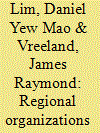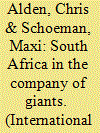| Srl | Item |
| 1 |
ID:
192171


|
|
|
|
|
| Summary/Abstract |
Indigenous peoples in Southeast Asia have organized on issues that affect their rights at the local, national, regional and global level. This article argues that one important component of the rise of this activism is the presence of regional scalar bridging organizations that link activism across scales and support the growth of Indigenous movements by providing access to global and regional opportunities for action. In Southeast Asia, the Asian Indigenous Peoples Pact (AIPP) and Tebtebba play this role through their presence in global political arenas and their many activities with partner organizations in the region. Drawing on social movement theory, this article outlines how regional social movement organizations potentially support global activism in the Global South by scale bridging in the areas of (1) resource mobilization, (2) creation of political spaces and opportunities and (3) the diffusion of ideas. To illustrate this, the case of Indigenous peoples activism on climate change in Southeast Asia is presented through an examination of the work done in these three areas by the Asian Indigenous Peoples Pact (AIPP) and Tebtebba
|
|
|
|
|
|
|
|
|
|
|
|
|
|
|
|
| 2 |
ID:
119686


|
|
|
|
|
| Publication |
2013.
|
| Summary/Abstract |
Do regional hegemons use their power in regional organizations to advance foreign policy objectives? The authors investigate whether Japan leverages its privileged position at the Asian Development Bank (adb) to facilitate project loans for the elected Asian members of the United Nations Security Council (UNSC), a platform from which it seeks to shape global affairs. Analyzing panel data of adb loan disbursements to twenty-four developing member-countries from 1968 to 2009, the authors find that temporary UNSC membership increases adb loans, particularly during the post-1985 period, when Japan asserted greater influence in multilateral organizations. They estimate an average increase of over 30 percent. Because of Japan's checkered history of imperialism, the adb provides a convenient mechanism by which the government can obfuscate favors for politically important countries. Acting through this regional organization enables Japan to reconcile a low-key approach to foreign affairs with the contradictory goal of global activism-leading without appearing unilateralist.
|
|
|
|
|
|
|
|
|
|
|
|
|
|
|
|
| 3 |
ID:
119441


|
|
|
|
|
| Publication |
2013.
|
| Summary/Abstract |
South Africa, the continental economic giant and self-appointed spokesman for African development, is finding its distinctive national voice.
Emboldened by the invitation to join the BRICS grouping, its membership of the G20 and a second term on the UN Security Council, Pretoria is beginning to capitalize on the decade of continental and global activism undertaken by Thabo Mbeki to assume a position of leadership. Gone is the defensive posturing which characterized much of the ANC's post-apartheid foreign policy, replaced by an unashamed claim to African leadership.
The result is that South Africa is exercising a stronger hand in continental affairs, ranging from a significant contribution to state-building in the Democratic Republic of the Congo and South Sudan, to an unprecedented assertiveness on Zimbabwe.
But this new assertiveness remains constrained by three factors: the unresolved issue of identity, a host of domestic constraints linked to material capabilities and internal politics, and the divisive continental reaction to South African leadership. These factors continue to inhibit the country's ability to translate its international ambitions and global recognition into a concrete set of foreign policy achievements.
|
|
|
|
|
|
|
|
|
|
|
|
|
|
|
|